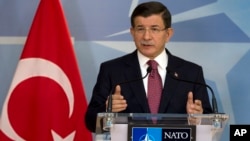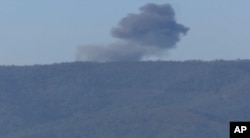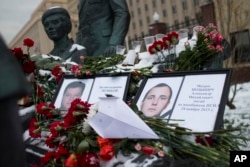U.S. diplomats and military officials are urging Russia and Turkey to tone down their rhetoric, worried the growing dispute over last week’s downing of a Russian fighter plane near the Turkish border with Syria could further enflame an already embattled region.
U.S. defense officials said Monday Russia had heightened its force posture in Syria, making good on promises to position S-400 surface-to-air missile batteries at its bases there. Officials said they were also aware Russia had for the first time equipped some of its Su-34 Fullback fighter jets in Syria with air-to-air missiles.
“Everyone wants to avoid miscalculation,” a U.S. official told VOA on condition of anonymity, adding there is growing concern Russia seems intent on using its involvement in Syria as “an opportunity to showcase their new arsenal.”
Pentagon officials also warned Russia’s actions were cause for concern, opening the door for dangerous missteps while also taking the focus off efforts to counter the terror group known as Islamic State.
“Whether it’s putting air-to-air missiles on planes or putting in surface-to-air missiles, those are things that are clearly not about ISIL as ISIL does not have any aircraft,” said Pentagon spokesman Capt. Jeff Davis, using an acronym for the Islamic State terror group.
General to general
In a potential effort to calm the situation, the top-ranking U.S. military officer reached out to his Russian counterpart Monday.
“We initiated the call,” a U.S. official told VOA, describing the conversation between U.S. Chairman of the Joint Chiefs of Staff, Gen. Joseph Dunford, and Russian Gen. Valery Gerasimov as “very professional.”
The official refused to share details of what was discussed but said the goal was to make sure the lines of communication remained open, noting it was the first time Gen. Dunford has spoken to his Russian counterpart since being sworn-in in October.
Despite calls for calm, Turkey and Russia appeared to harden their stances Monday.
Following a meeting with NATO Monday in Brussels, Turkish Prime Minister Ahmet Davutoglu said his country will not apologize for shooting down the Russian fighter jet, telling reporters Turkey’s forces did their "duty" by protecting the country's airspace.
Meanwhile, Russian President Vladimir Putin on Monday called Turkey’s actions a "huge mistake."
Putin refused to meet with Turkish President Recep Tayyip Erdogan on the sidelines of a climate change conference in Paris and instead accused Turkey of being in league with Islamic State terrorists.
"We have received additional data which confirm that Islamic State oil ... enters the territory of Turkey," Putin told reporters in Paris. "The decision to shoot down the plane was dictated specifically by a desire to defend supplies."
Airspace violation
Turkish officials have dismissed such charges as slander, insisting the Russian jet violated Turkish airspace.
U.S. officials lent support to Ankara’s contention Monday.
"The available information including evidence from Turkey and our own sources indicates the Russian aircraft violated Turkish airspace,” U.S. State Department spokeswoman Elizabeth Trudeau told reporters in Washington. “We also know that the Turks warned the Russian pilots multiple times before the airspace violation to which the Turks received no response."
The body of one of the pilots of the downed jet left on a flight from Ankara back to Russia on Monday. Russian and Syrian forces rescued the plane's second pilot, while another Russian soldier was killed during the rescue effort.
State Department Correspondent Pam Dockins contributed to this report.






